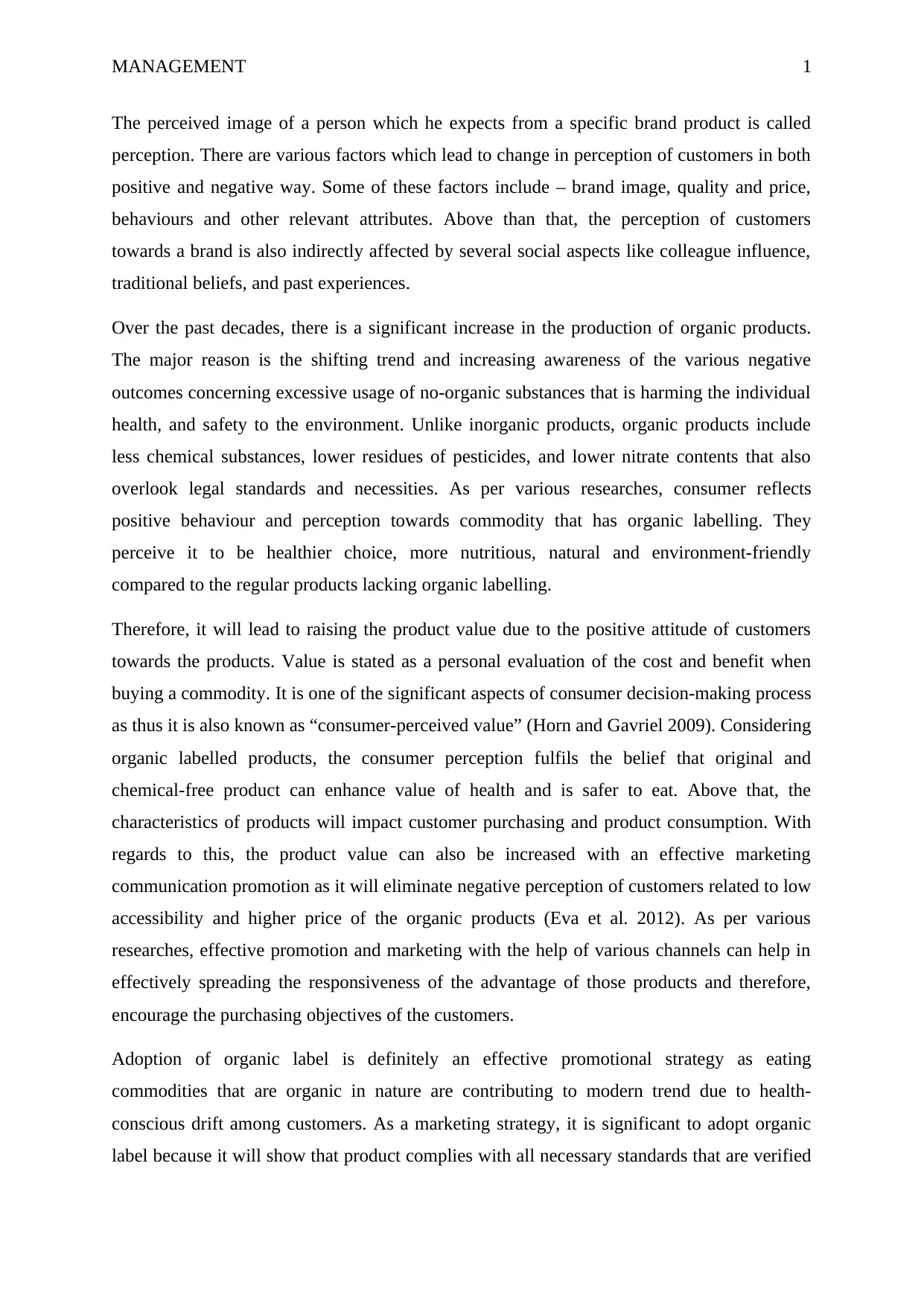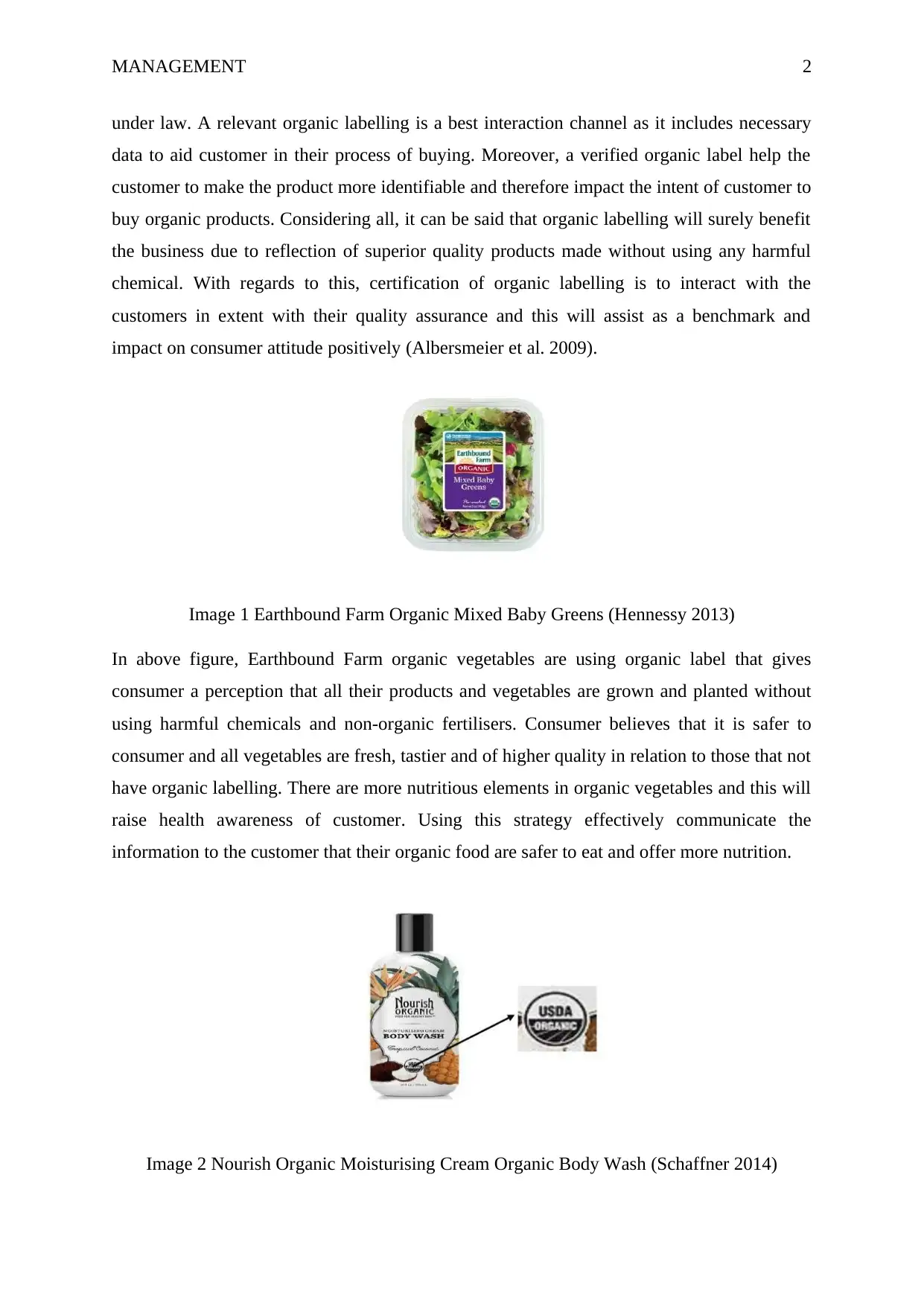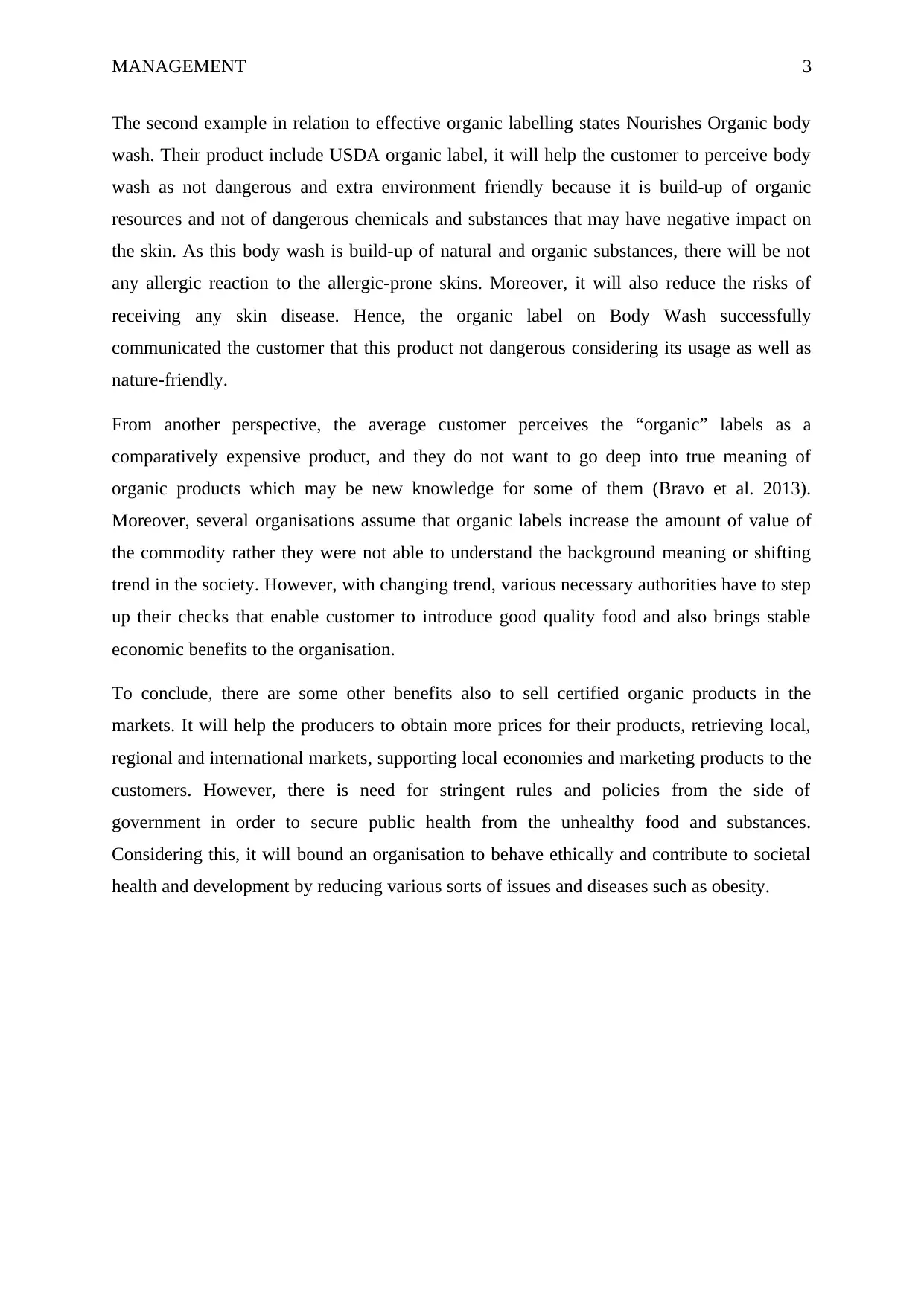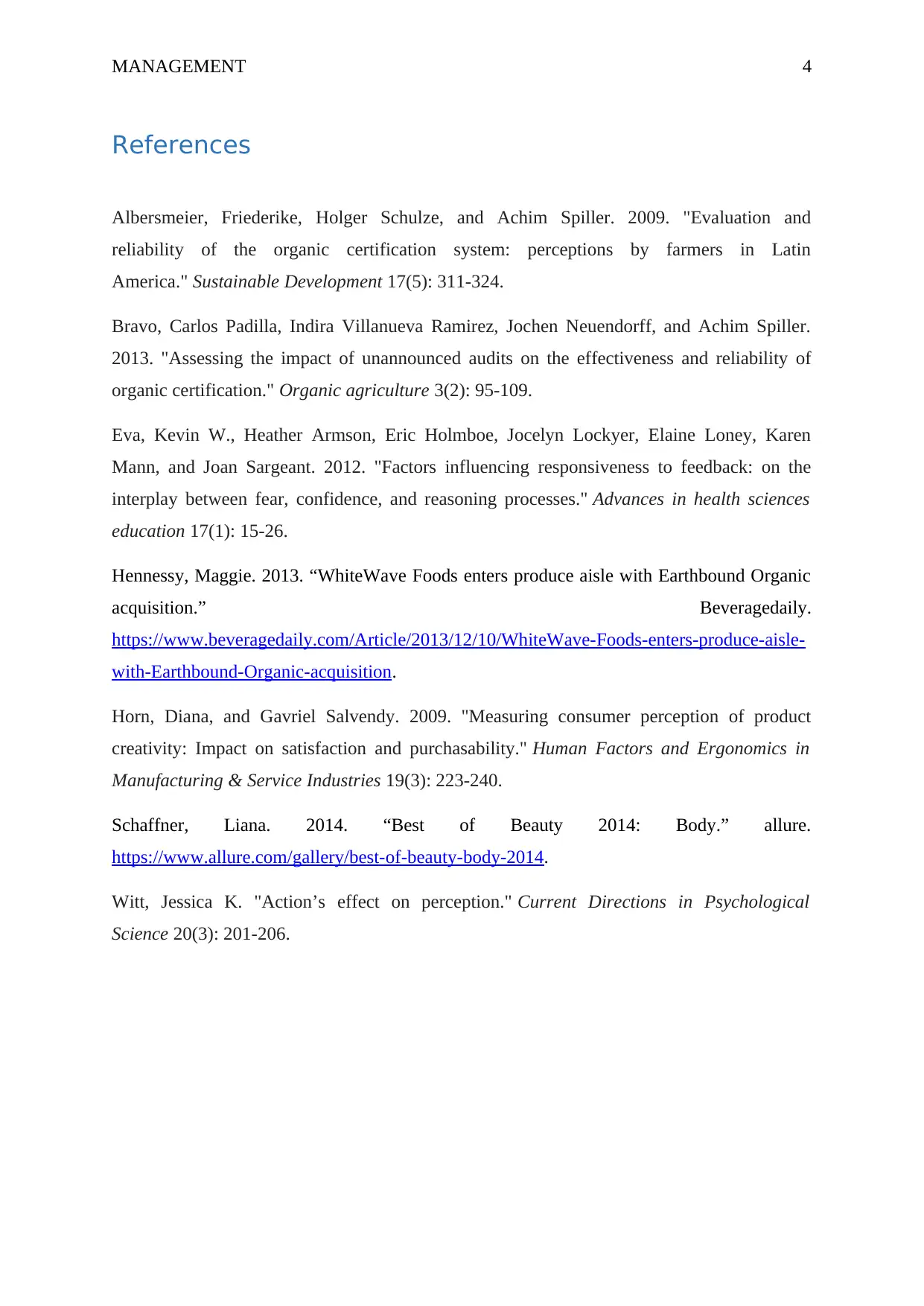Discovering Marketing (MKTG 1000) Assignment: Organic Labeling Impact
VerifiedAdded on 2023/01/17
|5
|1321
|59
Report
AI Summary
This report analyzes the impact of organic labeling on consumer perception and marketing strategies. It explores how consumers perceive organic products, emphasizing their health benefits and environmental friendliness compared to conventional products. The report discusses factors influencing consumer perception, including brand image, quality, and social influences. It highlights the role of organic labels as effective marketing tools, enhancing product value and influencing purchasing decisions. The report also examines the importance of effective marketing communication in promoting organic products and addressing consumer concerns about price and accessibility. Furthermore, it discusses the benefits of organic labeling for businesses, including higher prices and access to various markets. The report concludes by emphasizing the need for stringent regulations to ensure public health and promote ethical business practices. The report uses examples of Earthbound Farm and Nourish Organic to illustrate the impact of organic labeling.

Running Head: MANAGEMENT 0
Discovering marketing
Discovering marketing
Paraphrase This Document
Need a fresh take? Get an instant paraphrase of this document with our AI Paraphraser

MANAGEMENT 1
The perceived image of a person which he expects from a specific brand product is called
perception. There are various factors which lead to change in perception of customers in both
positive and negative way. Some of these factors include – brand image, quality and price,
behaviours and other relevant attributes. Above than that, the perception of customers
towards a brand is also indirectly affected by several social aspects like colleague influence,
traditional beliefs, and past experiences.
Over the past decades, there is a significant increase in the production of organic products.
The major reason is the shifting trend and increasing awareness of the various negative
outcomes concerning excessive usage of no-organic substances that is harming the individual
health, and safety to the environment. Unlike inorganic products, organic products include
less chemical substances, lower residues of pesticides, and lower nitrate contents that also
overlook legal standards and necessities. As per various researches, consumer reflects
positive behaviour and perception towards commodity that has organic labelling. They
perceive it to be healthier choice, more nutritious, natural and environment-friendly
compared to the regular products lacking organic labelling.
Therefore, it will lead to raising the product value due to the positive attitude of customers
towards the products. Value is stated as a personal evaluation of the cost and benefit when
buying a commodity. It is one of the significant aspects of consumer decision-making process
as thus it is also known as “consumer-perceived value” (Horn and Gavriel 2009). Considering
organic labelled products, the consumer perception fulfils the belief that original and
chemical-free product can enhance value of health and is safer to eat. Above that, the
characteristics of products will impact customer purchasing and product consumption. With
regards to this, the product value can also be increased with an effective marketing
communication promotion as it will eliminate negative perception of customers related to low
accessibility and higher price of the organic products (Eva et al. 2012). As per various
researches, effective promotion and marketing with the help of various channels can help in
effectively spreading the responsiveness of the advantage of those products and therefore,
encourage the purchasing objectives of the customers.
Adoption of organic label is definitely an effective promotional strategy as eating
commodities that are organic in nature are contributing to modern trend due to health-
conscious drift among customers. As a marketing strategy, it is significant to adopt organic
label because it will show that product complies with all necessary standards that are verified
The perceived image of a person which he expects from a specific brand product is called
perception. There are various factors which lead to change in perception of customers in both
positive and negative way. Some of these factors include – brand image, quality and price,
behaviours and other relevant attributes. Above than that, the perception of customers
towards a brand is also indirectly affected by several social aspects like colleague influence,
traditional beliefs, and past experiences.
Over the past decades, there is a significant increase in the production of organic products.
The major reason is the shifting trend and increasing awareness of the various negative
outcomes concerning excessive usage of no-organic substances that is harming the individual
health, and safety to the environment. Unlike inorganic products, organic products include
less chemical substances, lower residues of pesticides, and lower nitrate contents that also
overlook legal standards and necessities. As per various researches, consumer reflects
positive behaviour and perception towards commodity that has organic labelling. They
perceive it to be healthier choice, more nutritious, natural and environment-friendly
compared to the regular products lacking organic labelling.
Therefore, it will lead to raising the product value due to the positive attitude of customers
towards the products. Value is stated as a personal evaluation of the cost and benefit when
buying a commodity. It is one of the significant aspects of consumer decision-making process
as thus it is also known as “consumer-perceived value” (Horn and Gavriel 2009). Considering
organic labelled products, the consumer perception fulfils the belief that original and
chemical-free product can enhance value of health and is safer to eat. Above that, the
characteristics of products will impact customer purchasing and product consumption. With
regards to this, the product value can also be increased with an effective marketing
communication promotion as it will eliminate negative perception of customers related to low
accessibility and higher price of the organic products (Eva et al. 2012). As per various
researches, effective promotion and marketing with the help of various channels can help in
effectively spreading the responsiveness of the advantage of those products and therefore,
encourage the purchasing objectives of the customers.
Adoption of organic label is definitely an effective promotional strategy as eating
commodities that are organic in nature are contributing to modern trend due to health-
conscious drift among customers. As a marketing strategy, it is significant to adopt organic
label because it will show that product complies with all necessary standards that are verified

MANAGEMENT 2
under law. A relevant organic labelling is a best interaction channel as it includes necessary
data to aid customer in their process of buying. Moreover, a verified organic label help the
customer to make the product more identifiable and therefore impact the intent of customer to
buy organic products. Considering all, it can be said that organic labelling will surely benefit
the business due to reflection of superior quality products made without using any harmful
chemical. With regards to this, certification of organic labelling is to interact with the
customers in extent with their quality assurance and this will assist as a benchmark and
impact on consumer attitude positively (Albersmeier et al. 2009).
Image 1 Earthbound Farm Organic Mixed Baby Greens (Hennessy 2013)
In above figure, Earthbound Farm organic vegetables are using organic label that gives
consumer a perception that all their products and vegetables are grown and planted without
using harmful chemicals and non-organic fertilisers. Consumer believes that it is safer to
consumer and all vegetables are fresh, tastier and of higher quality in relation to those that not
have organic labelling. There are more nutritious elements in organic vegetables and this will
raise health awareness of customer. Using this strategy effectively communicate the
information to the customer that their organic food are safer to eat and offer more nutrition.
Image 2 Nourish Organic Moisturising Cream Organic Body Wash (Schaffner 2014)
under law. A relevant organic labelling is a best interaction channel as it includes necessary
data to aid customer in their process of buying. Moreover, a verified organic label help the
customer to make the product more identifiable and therefore impact the intent of customer to
buy organic products. Considering all, it can be said that organic labelling will surely benefit
the business due to reflection of superior quality products made without using any harmful
chemical. With regards to this, certification of organic labelling is to interact with the
customers in extent with their quality assurance and this will assist as a benchmark and
impact on consumer attitude positively (Albersmeier et al. 2009).
Image 1 Earthbound Farm Organic Mixed Baby Greens (Hennessy 2013)
In above figure, Earthbound Farm organic vegetables are using organic label that gives
consumer a perception that all their products and vegetables are grown and planted without
using harmful chemicals and non-organic fertilisers. Consumer believes that it is safer to
consumer and all vegetables are fresh, tastier and of higher quality in relation to those that not
have organic labelling. There are more nutritious elements in organic vegetables and this will
raise health awareness of customer. Using this strategy effectively communicate the
information to the customer that their organic food are safer to eat and offer more nutrition.
Image 2 Nourish Organic Moisturising Cream Organic Body Wash (Schaffner 2014)
⊘ This is a preview!⊘
Do you want full access?
Subscribe today to unlock all pages.

Trusted by 1+ million students worldwide

MANAGEMENT 3
The second example in relation to effective organic labelling states Nourishes Organic body
wash. Their product include USDA organic label, it will help the customer to perceive body
wash as not dangerous and extra environment friendly because it is build-up of organic
resources and not of dangerous chemicals and substances that may have negative impact on
the skin. As this body wash is build-up of natural and organic substances, there will be not
any allergic reaction to the allergic-prone skins. Moreover, it will also reduce the risks of
receiving any skin disease. Hence, the organic label on Body Wash successfully
communicated the customer that this product not dangerous considering its usage as well as
nature-friendly.
From another perspective, the average customer perceives the “organic” labels as a
comparatively expensive product, and they do not want to go deep into true meaning of
organic products which may be new knowledge for some of them (Bravo et al. 2013).
Moreover, several organisations assume that organic labels increase the amount of value of
the commodity rather they were not able to understand the background meaning or shifting
trend in the society. However, with changing trend, various necessary authorities have to step
up their checks that enable customer to introduce good quality food and also brings stable
economic benefits to the organisation.
To conclude, there are some other benefits also to sell certified organic products in the
markets. It will help the producers to obtain more prices for their products, retrieving local,
regional and international markets, supporting local economies and marketing products to the
customers. However, there is need for stringent rules and policies from the side of
government in order to secure public health from the unhealthy food and substances.
Considering this, it will bound an organisation to behave ethically and contribute to societal
health and development by reducing various sorts of issues and diseases such as obesity.
The second example in relation to effective organic labelling states Nourishes Organic body
wash. Their product include USDA organic label, it will help the customer to perceive body
wash as not dangerous and extra environment friendly because it is build-up of organic
resources and not of dangerous chemicals and substances that may have negative impact on
the skin. As this body wash is build-up of natural and organic substances, there will be not
any allergic reaction to the allergic-prone skins. Moreover, it will also reduce the risks of
receiving any skin disease. Hence, the organic label on Body Wash successfully
communicated the customer that this product not dangerous considering its usage as well as
nature-friendly.
From another perspective, the average customer perceives the “organic” labels as a
comparatively expensive product, and they do not want to go deep into true meaning of
organic products which may be new knowledge for some of them (Bravo et al. 2013).
Moreover, several organisations assume that organic labels increase the amount of value of
the commodity rather they were not able to understand the background meaning or shifting
trend in the society. However, with changing trend, various necessary authorities have to step
up their checks that enable customer to introduce good quality food and also brings stable
economic benefits to the organisation.
To conclude, there are some other benefits also to sell certified organic products in the
markets. It will help the producers to obtain more prices for their products, retrieving local,
regional and international markets, supporting local economies and marketing products to the
customers. However, there is need for stringent rules and policies from the side of
government in order to secure public health from the unhealthy food and substances.
Considering this, it will bound an organisation to behave ethically and contribute to societal
health and development by reducing various sorts of issues and diseases such as obesity.
Paraphrase This Document
Need a fresh take? Get an instant paraphrase of this document with our AI Paraphraser

MANAGEMENT 4
References
Albersmeier, Friederike, Holger Schulze, and Achim Spiller. 2009. "Evaluation and
reliability of the organic certification system: perceptions by farmers in Latin
America." Sustainable Development 17(5): 311-324.
Bravo, Carlos Padilla, Indira Villanueva Ramirez, Jochen Neuendorff, and Achim Spiller.
2013. "Assessing the impact of unannounced audits on the effectiveness and reliability of
organic certification." Organic agriculture 3(2): 95-109.
Eva, Kevin W., Heather Armson, Eric Holmboe, Jocelyn Lockyer, Elaine Loney, Karen
Mann, and Joan Sargeant. 2012. "Factors influencing responsiveness to feedback: on the
interplay between fear, confidence, and reasoning processes." Advances in health sciences
education 17(1): 15-26.
Hennessy, Maggie. 2013. “WhiteWave Foods enters produce aisle with Earthbound Organic
acquisition.” Beveragedaily.
https://www.beveragedaily.com/Article/2013/12/10/WhiteWave-Foods-enters-produce-aisle-
with-Earthbound-Organic-acquisition.
Horn, Diana, and Gavriel Salvendy. 2009. "Measuring consumer perception of product
creativity: Impact on satisfaction and purchasability." Human Factors and Ergonomics in
Manufacturing & Service Industries 19(3): 223-240.
Schaffner, Liana. 2014. “Best of Beauty 2014: Body.” allure.
https://www.allure.com/gallery/best-of-beauty-body-2014.
Witt, Jessica K. "Action’s effect on perception." Current Directions in Psychological
Science 20(3): 201-206.
References
Albersmeier, Friederike, Holger Schulze, and Achim Spiller. 2009. "Evaluation and
reliability of the organic certification system: perceptions by farmers in Latin
America." Sustainable Development 17(5): 311-324.
Bravo, Carlos Padilla, Indira Villanueva Ramirez, Jochen Neuendorff, and Achim Spiller.
2013. "Assessing the impact of unannounced audits on the effectiveness and reliability of
organic certification." Organic agriculture 3(2): 95-109.
Eva, Kevin W., Heather Armson, Eric Holmboe, Jocelyn Lockyer, Elaine Loney, Karen
Mann, and Joan Sargeant. 2012. "Factors influencing responsiveness to feedback: on the
interplay between fear, confidence, and reasoning processes." Advances in health sciences
education 17(1): 15-26.
Hennessy, Maggie. 2013. “WhiteWave Foods enters produce aisle with Earthbound Organic
acquisition.” Beveragedaily.
https://www.beveragedaily.com/Article/2013/12/10/WhiteWave-Foods-enters-produce-aisle-
with-Earthbound-Organic-acquisition.
Horn, Diana, and Gavriel Salvendy. 2009. "Measuring consumer perception of product
creativity: Impact on satisfaction and purchasability." Human Factors and Ergonomics in
Manufacturing & Service Industries 19(3): 223-240.
Schaffner, Liana. 2014. “Best of Beauty 2014: Body.” allure.
https://www.allure.com/gallery/best-of-beauty-body-2014.
Witt, Jessica K. "Action’s effect on perception." Current Directions in Psychological
Science 20(3): 201-206.
1 out of 5
Related Documents
Your All-in-One AI-Powered Toolkit for Academic Success.
+13062052269
info@desklib.com
Available 24*7 on WhatsApp / Email
![[object Object]](/_next/static/media/star-bottom.7253800d.svg)
Unlock your academic potential
Copyright © 2020–2025 A2Z Services. All Rights Reserved. Developed and managed by ZUCOL.





